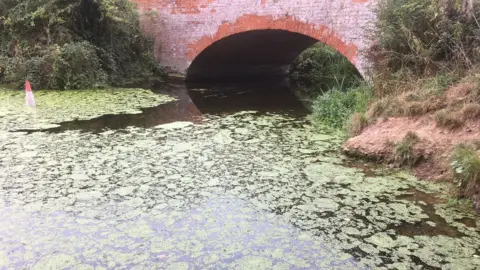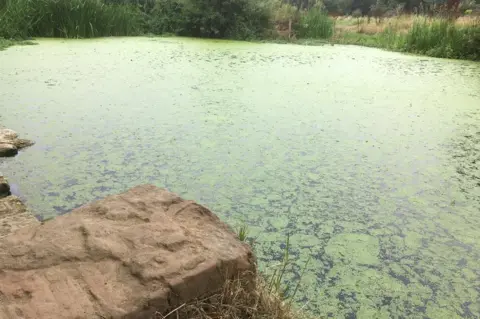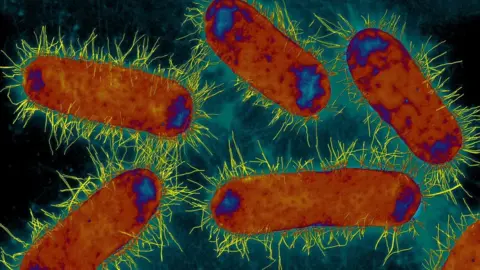E. coli warning at Suffolk's River Deben swimming spot
 Guy Campbell/BBC
Guy Campbell/BBCSigns have gone up warning people not to enter the water at a popular bathing and swimming spot due to high levels of E. coli.
Testing was carried out in Ufford in Suffolk after concerns about the water quality in the River Deben were raised.
Ufford Parish Council said it found levels of bacteria that were far higher than government standards at Hawkswade Bridge, known locally as Ufford Hole.
The Environment Agency said the Deben was not designated for bathing.
The council said some readings from its tests showed 5,900 colony forming units per 100ml of water.
According to government guidelines, a good coastal or inland bathing water should be less than 500 colony forming units per 100ml of water.
The council said lots of people swim, bathe and let their children and dogs into the water, so it worked with the landowner to put up the signs.
It said it and the landowner were looking into what their obligations were.
 Guy Campbell/BBC
Guy Campbell/BBCThe Environment Agency (EA) said it monitored E.coli at designated bathing waters but "the River Deben is not a designated bathing water" although it welcomed "the growing interest of people using rivers and open waters for recreation".
"However, current regulations for rivers and open waters in England protect wildlife and are not designed for the protection of human health," a spokesman said.
A report earlier this year said there were no rivers in Suffolk that currently met government targets for good water quality.
 Guy Campbell/BBC
Guy Campbell/BBCLocal testing started as part of a project led by Woodbridge Town Council member Eamonn O'Nolan and the University of Suffolk.
The EA has said E. coli can enter rivers from a number of sources.
It said it was a naturally-occurring bacteria found in the guts of all warm-blooded animals and humans.

 Science Photo Library
Science Photo LibraryWhat is E. coli?
Escherichia coli (E. coli) bacteria are found in the intestines of humans and animals. There are many different types - some are harmless and others can cause a variety of diseases.
The bacterium is found in faeces and can survive in the environment.
It can cause a range of diseases including urinary tract infection, cystitis (infection of the bladder), and intestinal infection.
Infections can be serious and often cause severe diarrhoea, sometimes with blood in it, abdominal cramps and fever.
Bacteraemia (blood stream infection) may be caused by primary infections spreading to the blood.
Source: Public Health England

Find BBC News: East of England on Facebook, Instagram and Twitter. If you have a story suggestion email [email protected]
